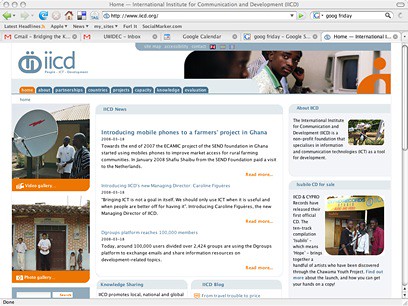As well as having insufficient access to food, education and health care, disadvantaged people in developing countries may lack access to public services, technical innovations and even electricity. They may be excluded from political processes, be unaware of what is going on, and unable to voice their needs. ICT can be a powerful economic, social and political tool when placed in their hands. It can help them to access, process and disseminate information quickly, effectively and on an unprecedented scale. Better access to ICT is particularly vital in enabling them to address issues such as poverty, illiteracy and general lack of development.
This is the view of the International Institute for Communication and Development (IICD) - a non-profit foundation that specialises in information and communication technology (ICT) as a tool for development.

IICD creates practical and sustainable solutions using both modern media (such as computers, Internet, email and multimedia) and traditional media (such as radio and television) to connect people and enable them to benefit from ICT, thereby contributing to the Millenium Development Goals.
Together with partners from the public, private and non-profit sector, IICD puts knowledge, innovation and finance to work. Currently, IICD is active in Bolivia, Burkina Faso, Ecuador, Ghana, Jamaica, Mali, Tanzania, Uganda and Zambia in the sectors education, environment, governance, health and livelihoods (agriculture).
No comments:
Post a Comment